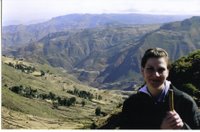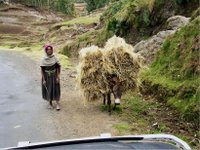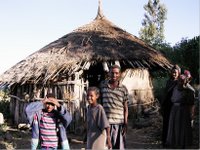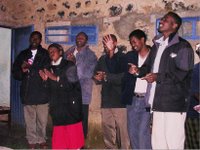Ethiopia








It's been about 2 1/2 years since I went to Ethiopia. I travelled there on my first international journalism assignment with the Presbyterian Record - the magazine I currently work for. It was a study tour for the other participants -- a time for church-goers to see the effects of a charity they support. In this case, it was the Canadian Foodgrains Bank (CFGB - www.foodgrainsbank.ca); an agency made up of 13 member churches (of which the Presbyterian Church is one), that provides food to countries in emergency situations as well as providing "food-for-work" programs, that enable long-term development of communities. It is a great organization, doing good work, which I saw with my own eyes in Ethiopia.
Even though I was only in this East African country for two weeks, it remains close to my heart. It is a fascinating, beautiful place made up of amazing people. Although poverty is rampant there, the country was not what I expected. There were rolling green hills, relatively modern hotels, colourful gardens, breath-taking landscapes and smiling people. It was a far cry from the sad scenes we saw on TV during the famine of 1984-85, when starving children with bloated bellies and flies on their faces left many thinking this is all Ethiopia had to offer. Ethiopia's story is indeed a sad one; constant drought makes famine an always-present reality, while land that has been worked so consistently for thousands of years, that it simply has nothing left to give. Trees are cut down, soil is eroded, farming practices are those of Biblical times and crop yield, therefore, is often low. Where CFGB and other aid agenices have been working, communities have updated farming practices, better tools and water conservation and storage capacity, insuring farmers can irrigate their crops even during the dry season. Despite the often sad reality, Ethiopia is still a beautiful place, filled with warm, friendly people.
Ethiopia is also a country that prides itself on its deep religious roots. It is said to be one of the first places to hear of Christianity (and quickly developed this faith as its national religion -- the Ethiopian Orthodox Church is still a strong force in the country) and legend says the Queen of Sheba (part of present-day Ethiopia) had some kind of interlude with King Solomon, and that the long-lost Arc of the Covenant resides there. Religious holidays are almost as common as weekends, which often interfere with work productivity.
Ethiopians are a proud people -- partly stemming from the fact that it is the only African country that was never colonized (save for a short-lived Italian occupation in 1936), and their pride -- along with amazing generosity -- can still be seen today.
I could write pages more, but figure I should stop and just post some pictures. One more thing: Ethiopia has the most delicious coffee you will ever taste (in fact, it is credited as coffee's birth place) and the coffee ceremony is an important part of Ethiopian culture.
Until next time!
A.


0 Comments:
Post a Comment
<< Home